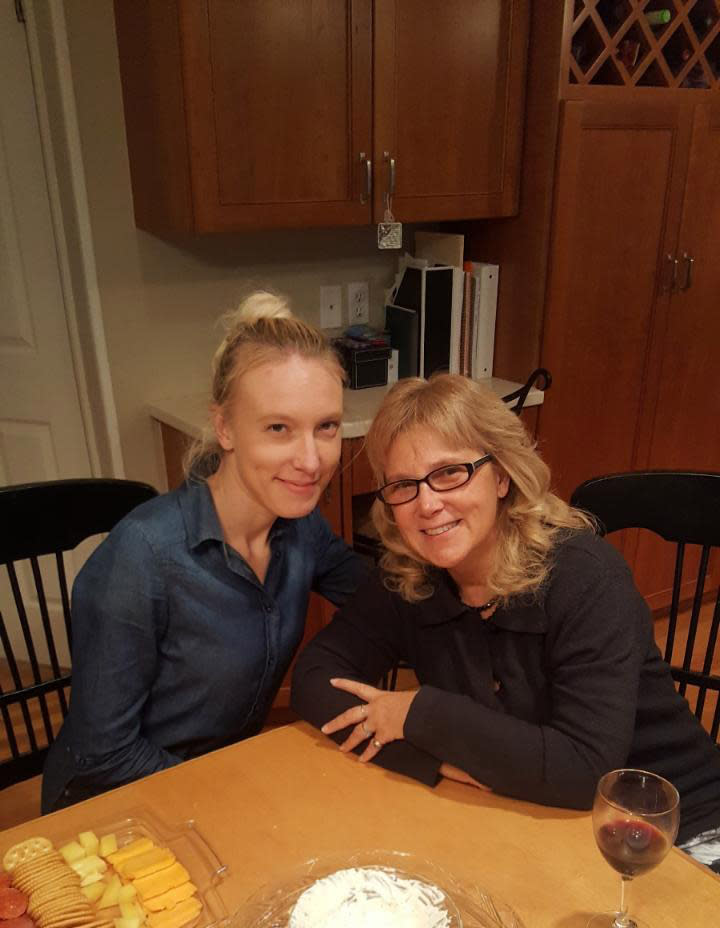This Is What It's Really Like to Live With Early-Stage Alzheimer's Disease

Rev. Cynthia Huling Hummel, D.Min., was diagnosed with mild cognitive impairment (MCI), a decline in cognitive abilities that often precedes Alzheimer's disease, in 2011. Last year, at age 62, her diagnosis shifted from MCI to early-stage Alzheimer's. A musician and Presbyterian pastor, she was inducted into the New York State Country Music Hall of Honor last October. This is her story.
I knew something was wrong the day I got lost on my way to the cemetery. I'm a pastor and I had a family waiting for me to do a graveside service. Frustrated and upset, I called a friend for help; he thought I was joking. It was the only cemetery in town and I'd been there before. I was completely embarrassed.
The warning signs had begun years earlier, when I was 50 and preparing to defend my doctoral thesis at the McCormick Theological Seminary in Chicago. Most people in a doctoral program can rattle off the books they've read, but all I could tell you was the first three courses I'd taken. I could only name one of my professors. I didn't remember any of my fellow students. I would see people whom I knew in the grocery store and walk right by them because I didn't recognize them. It was terrifying because I was in the middle of this program that I'd worked so hard to complete.
I went from one doctor to another as they tried to determine what was wrong with me. Because I was young, no one suspected Alzheimer's disease. There were lots of dead ends as I underwent neuropsychological scans, CT scans, MRIs, and a spinal tap. One doctor thought the stress of running a parish and raising a family was the cause; another suspected a head injury I'd sustained as a child. Others blamed menopause or not getting enough sleep.

Answers came when I moved to a new pastorate in Waverly, New York, which meant I was starting over again with a new doctor but the same questions. One of my lowest moments, a turning point, happened when this new doctor asked me to recall the books of the Old Testament. I knew Genesis but I started singing the song we teach children to help them memorize the books to jog my memory. I got only partway through the song before tears started rolling down my face. How could I be a pastor when I couldn't even name the books in the Bible? It would be as if a doctor couldn't remember the bones in the body. The basic building blocks of my faith were gone. I had my doctorate by that point, but I didn't feel smart.
When I was finally diagnosed with mild cognitive impairment in the spring of 2011, at age 57, I felt a myriad of emotions. I was sad, of course, but I wasn't shocked because my mother was living with Alzheimer's and her only brother had died of the disease. In many ways, it was relief to put a label on my disability. I thought, I'm not crazy-there are physical changes happening in my brain that are causing problems with my memory. It was a relief to know that I wasn't imagining things. Before, people would try to commiserate by saying, oh, we all forget things.
As a pastor, when someone confides in you, they're often sharing information that's very emotionally painful for them. You listen with an open and loving heart and they expect that you'll remember what they've told you. But I would forget entire conversations, and some people- justifiably so-would misunderstand that as a lack of caring.

I tried my best to make up for my disability by sending myself emails, leaving voicemails for myself, and taking copious notes. But you can't take notes when someone's pouring out their heart to you about a tough situation in their life. You can't stop and say, wait a minute, let me go over that again, like a reporter would. Sometimes people would walk into my office and want to pick up on a conversation where we had left off and I couldn't. I would have to write down every single sermon that I preached so wouldn't duplicate myself. It was exhausting.
When the burden of trying to "fake" memory became too much, my doctor suggested I leave my career and go on disability. Closing that chapter of my life broke my heart because I loved being a pastor. I was angry with God. Why me, why now? I thought. I had been so faithful, studied so hard for my doctorate, and prepared myself, and now I was going to have to leave. But a very wise woman from my church named Bertie told me something I needed to hear. She said, "Pastor Cynthia, don't worry, God is clearing your plate so you can do other things."
When I saw an ad in the local paper for an eight-week course sponsored by the Alzheimer's Association I figured I'd better sign up. I drove to that first class and sat in the parking lot and I cried. I've come along way since then. I soon became involved with my local Alzheimer's Association chapter and I eventually served on the Association's National Early-Stage Advisory Committee. In my role, I spoke to groups and conducted media interviews to share my story and insights about the disease. Most important, I connected with other people living with the disease and their families to offer advice and support. I tell them that no one should travel this difficult journey alone.


My mother passed away in 2014. She was a woman of great culture and wisdom, who had been a member of the prestigious academic honors society Phi Beta Kappa while at Brown University. She worked as a school librarian. She loved to sing and volunteered for many organizations in her spare time. She was someone who always looked for the blessings in every situation. She used to say, "Into every life a little rain must fall." I've taken her lessons to heart as I've soldiered on.
I've been in a clinical study for the past six years. I'm a huge proponent of participating in these studies because I believe it's the only way we're ever going to have a cure. I go in for annual cognitive and medical testing; researchers look at the physical changes in my brain and compare them with results from my cognitive performance tests in the areas of memory and executive function.
I'm not on medication because that would exclude me from the study, but I take care to get enough sleep, exercise every day, and eat a plant-based MIND diet, which has been shown to slow cognitive decline. I have salad every day and a glass of red wine every night, plus plenty of salmon (for omega-3 fatty acids), and a handful of nuts once or twice a day. I swim three times a week, track my steps with a fitness tracker, and go kayaking with friends as often as possible. I audit classes at Elmira College. I've taken 30 so far, including French last semester. I usually don't remember squat, but I love it.

I also sing in a band called Country Magic. Twice a month, we perform for dementia patients at senior living centers because people like me remember music-it's one of the last memories to go. People light up when you sing a song from their past like "Amazing Grace" or "You Are My Sunshine." Sometimes audience members will request old country songs and we do our best to play them on the spot and get everyone to sing along. It's a great way to connect hearts and minds.
These days my ministry is Alzheimer's. I am so much happier now that I've accepted my diagnosis. There's a stigma associated with memory-loss disorders and oftentimes people are afraid to ask for help; I believe my calling is to help reduce that shame. You don't have to be embarrassed to have Alzheimer's. I tell people straight away, then it's no mystery why I sometimes repeat myself or get disoriented. It gives people a chance to show their friendship. I reach out to others who've received the diagnosis and offer myself as somebody they can talk to and relate to. I try to bring them hope and healing the way my friend Bertie did for me when my faith faltered. We need others to lean on; that's what community-whether it's a faith community or one built around doing an activity together-is about. There are many difficult times in life, but having people we can count on to walk with us makes all the difference.

I've had some tough conversations with my adult children, Will, 32, and Emily, 34, but I know that putting my wishes in writing will make things easier for them in the long run. They know, for example, that my brain is going to the University of Rochester so that Alzheimer's researchers can study it. I carry a piece of paper in my wallet stating as much, so that, should anything happen when I'm not at home, medical staff will know to put my brain on ice. My children know that when I'm no longer able to drive, they'll have to take my car keys from me. I know it's going to be hard, but I've told them, "Never forget how much I love you. I'll love you forever, even if I'm not looking very loving in that moment when you're prying those keys out of my hand."
Life doesn't end after an Alzheimer's diagnosis. Everyone faces crises, but the real challenge is moving from "why me?" to "what next?" I know things will slow down in the future. But I don't dwell on the future. I tell people to focus on each and every day and the blessings in that day, and I can't just stand in the pulpit and preach it, I've got to live it.
Follow Woman's Day on Instagram.
You Might Also Like

